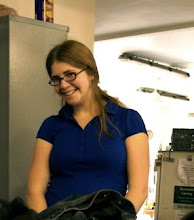Much to write about. It's been awhile, and a lot has happened. This is a pretty heady time of year in Israel - Pesach is followed very rapidly by Yom Hashoah (remembering the Holocaust), and then a week later, Yom Hazikaron (Memorial Day) and immediately after by Yom Ha'atzmaut (Israeli Independence Day).
I don't have much to say about what Yom Hashoah was like, as I spent most of it home sick with strep throat. I can say, that it is true, I verified it, that there is nothing on TV in Israel on Yom Hashoah except for Holocaust movies.
Yom HaZikaron, Memorial Day for fallen soldiers and victims of terror attacks, started tonight. A siren sounded across the country at 8pm, marking the beginning of the day. In addition to the state ceremony held at the Kotel, neighborhoods and communities all over Jerusalem held their own local ceremonies. Lauren and I, along with her roommate, went to the community ceremony in Baka, the neighborhood where many of my friends live.
We arrived a little late, so we were standing in the back, near the entrance, which was heavily guarded by security and police. Towards the end of the ceremony, a little boy, probably about 3 or 4 years old, started crying - he couldn't find his parents. Watching the police and the security push aside their guns, kneel down, and take care of this little boy who couldn't find his parents, juxtaposed with the ceremony mourning all of the children of Israel who have died - 22,682 since 1860 - was striking and poignant. It reminded me of the Yehuda Amichai poem, which I may have quoted here before, "An Arab Shepherd is Searching for His Goat on Mount Zion."
An Arab shepherd is searching for his goat on Mount Zion
And on the opposite hill I am searching for my little boy.
An Arab shepherd and a Jewish father
Both in their temporary failure.
These two holidays, so close together, with their drastic shift from the mourning of Yom HaZikaron to the celebration of Yom Ha'atzmaut, are very conducive to deep conversations about what Zionism is, what the State of Israel is and could be. Coming where they do in the cycle of my own time here, after I've been living in Jerusalem for a substantial amount of time, and am anticipating another year here, they raise questions of my own relationship to this place. We had a panel at Pardes today called "Keeping the Faith," with 3 Pardes alumni, who all made aliyah, and live very different lives in Israel, with very different outlooks. One speaker talked about how he is not an armchair Zionist, and by living in Israel and serving in the army, he engages in the dirty, practical work of Zionism. I also don't want to be an armchair Zionist, yet my understanding of what my role is in the dirty, practical work of Zionism doesn't equal aliyah and enlisting in the IDF. I'm still figuring out exactly what my role is, what my relationship is to this place.
Right now I'm listening to Galgalatz online (Israeli radio). On Yom HaZikaron, the radio stations all play sad music, transitioning to happier music as Yom Ha'atzmaut starts. Tomorrow, there is another siren in the morning, and in the afternoon, I'm going to the military cemetery, Har Herzl, with Pardes. Tomorrow night, I'm going to an "alternative beacon lighting ceremony, for a just, equitable, and deserving Israel," sponsored by
Yesh G'vul. There will be much more to share and reflect on over the next 48 hours.
Zichronam livracha - may their memories, of all those who have died because of this conflict, seeking safe homes and freedom for future generations, on both sides, be for a blessing - and may that blessing be that soon the day will come when a parent's greatest fear is losing their child in a crowd, not sending him or her off to war.






